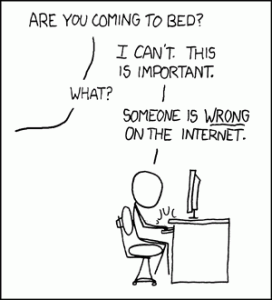I want you to do a little sanity check, because I’m worried it’s just me. Read the top moderated comment for the top items each day on HN and tell me if you’re also noticing that around 75% of them are posted by this guy:

If you buy bottled orange juice, read this. Now. And ruin your perception of OJ forever.
My favorite facebook tweet or whatever you call it in your stream. A Fweet maybe. Dave Lefkow, creator of BaconSalt and Bacon Lip Balm, playing in their R&D lab at J&D Foods with bacon and a bottle of Jack. Dude, you have my dream job!
Does anyone else not care about Google plus? Hitwise released a report that says Google+ traffic had declined by 3% for the week ending July 23. Google are of course in damage control mode and claiming that Hitwise ignores Android, iPhone and traffic to the web app and only takes into account traffic to the site itself.
Shouldn’t they all be growing virally? Google claims they’re in limited field trials, it’s invite only, etc, but I can get in and so can you I’m sure.
What worries me is that a social app that is truly engaging and social should have a very strong viral loop. New users invite new users.
If you’re Google, you’re starting with an audience of over a billion people. That’s a pretty good seed for your viral loop. They should be having to fight the traffic off with a sharp stick.
I think their strategy of softly-softly when launching new products hurts them in the long run. They’re so worried about down-time they’re sacrificing valuable PR buzz and new product momentum to avoid it. Twitter still goes down regularly and that hasn’t hurt them yet.
But the real problem I have with Google Plus is it’s fugly.
I don’t mean purely on design. The language they use to describe each product feature is like something out of The Boo Hoo Bird: “Circles”, “Hangouts”, “Sparks”.
I also think the designers are still suffering from PTSD from the Google Buzz debacle:
[box]Circles let you share with just the right audience.[/box]
i.e. We didn’t screw up this time. Pinkie promise!
Presh Talwalkar has an elegant explanation on why competing entities in an environment where demand is linearly distributed (like two burger stands on a beach) tend to cluster in the center of demand.
The intuitive explanation is this: Imagine two burger stands on a straight beach a mile long with the beach crowd evenly distributed along its length. Customers will gravitate towards the closest stand. If one stand was a quarter mile from the left and the other was a quarter mile from the right, they would have an equal number of customers.
But if one of the stands moved slightly towards the center, it would gain more customers and the other stand would lose those same customers (a zero sum game). So the optimal position for both stands is dead center i.e. on top of each other. That gives them both 50/50 market share and prevents the other stand from gaining more market share.
…even though it causes people on the beach to have to walk further to get a burger.
Check out Presh’s blog entry for a full explanation and accompanying graphics. He relates this to why politicians tend to position themselves in the political center and why news channels all carry the same stories.
Bringing this back to the real world, I wonder about things like goodwill, brand loyalty, pricing power, brand cachet and so on. Positioning yourself in the center of the beach, in the center of the political spectrum or, if you’re a news channel, carrying the stories everyone else carries does not engender much love in your target market.
If a competitor were to come along and position themselves off-center, they may sacrifice a portion of the market, but develop fierce loyalty among their customers for being better and being different.
This brings to mind many famous brands who started with a cult following:
Keith Hennessey does a spectacular job of explaining the complicated process of arriving at the federal budget and where it is currently stuck in this week’s Econtalk.
He also breaks down who has the power to move things forward right now. It’s so good I was tempted to transcribe selected bits here, but I just don’t have the darn time.
Got another call from the Obama campaign today who I spent a lot of time and energy supporting last election. I don’t support either party currently because I’ve evolved into an economic conservative but still socially liberal which leaves me stuck with no party to support.
So just for the hell of it I tried to convert the volunteer into a Hayekian liberal. After 5 minutes he still wouldn’t bite.
He did mention he’s had a rough day. Surprised, I am not.
According to Pando Networks, Seattle has the fastest average Internet speed in the country with an average speed of 1,017KBps. Compared to San Francisco and Austin who have 912KBps and 911KBps respectively
Someone just arrived at my blog by Googling:
WHAT IN THE WORLD IS GOING TO HAPPEN TO THESE PEOPLE IN THE US WITH THEIR SOCIAL SECURITY CHECKS
A reminder of the hard problems Google’s engineers are working on.